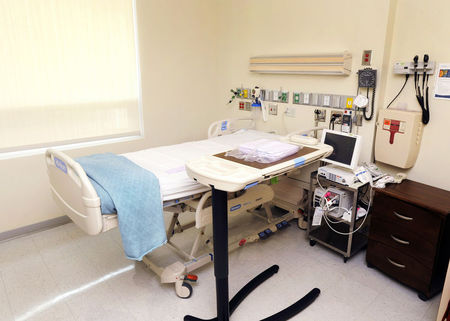By Julie Steenhuysen
CHICAGO (Reuters) - U.S. hospitals may be unprepared to safely dispose of the infectious waste generated by any Ebola virus disease patient to arrive unannounced in the country, potentially putting the wider community at risk, biosafety experts said.
Waste management companies are refusing to haul away the soiled sheets and virus-spattered protective gear associated with treating the disease, citing federal guidelines that require Ebola-related waste to be handled in special packaging by people with hazardous materials training, infectious disease and biosafety experts told Reuters.
Many U.S. hospitals are unaware of the regulatory snafu, which experts say could threaten their ability to treat any person who develops Ebola in the U.S. after coming from an infected region. It can take as long as 21 days to develop Ebola symptoms after exposure.
The issue created problems for Emory University Hospital in Atlanta, the first institution to care for Ebola patients here. As Emory was treating two U.S. missionaries who were evacuated from West Africa in August, their waste hauler, Stericycle, initially refused to handle it. Stericycle declined comment.
Ebola symptoms can include copious amounts of vomiting and diarrhoea, and nurses and doctors at Emory donned full hazmat suits to protect themselves. Bags of waste quickly began to pile up.
"At its peak, we were up to 40 bags a day of medical waste, which took a huge tax on our waste management system," Emory's Dr. Aneesh Mehta told colleagues at a medical meeting earlier this month.
Emory sent staff to Home Depot to buy as many 32-gallon rubber waste containers with lids that they could get their hands on. Emory kept the waste in a special containment area for six days until its Atlanta neighbour, the U.S. Centers for Disease Control and Prevention, helped broker an agreement with Stericycle.
While U.S. hospitals may be prepared clinically to care for a patient with Ebola, Emory's experience shows that logistically they are far from ready, biosafety experts said.
"Our waste management obstacles and the logistics we had to put in place were amazing," Patricia Olinger, director of environmental health and safety at Emory, said in an interview.
NOT IF, BUT WHEN
The worst Ebola outbreak on record is now projected to infect as many as 20,000 people in West Africa by November, while U.S. officials have said that number could rise above 550,000 by mid-January without an international intervention to contain its spread. Experts say it is only a matter of time before at least some infected patients are diagnosed in U.S. hospitals, most likely walking into the emergency department seeking treatment.
Already there have been several scares. As of Sept. 8, as many as 10 patients have been tested by U.S. hospitals for suspected Ebola cases, Dr. Barbara Knust, team leader for the CDC's Ebola response, said at a medical meeting this month. All tested negative.
The CDC has issued detailed guidelines on how hospitals can care for such patients, but their recommendations for handling Ebola waste differs from the U.S. Department of Transportation, which regulates the transportation of infectious waste.
CDC advises hospitals to place Ebola-infected items in leak-proof containers and discard them as they would other biohazards that fall into the category of "regulated medical waste." According to DOT guidelines, items in this category can't be in a form that can cause human harm. The DOT classifies Ebola as a Category A agent, or one that is potentially life-threatening.
DOT regulations say transporting Category A items requires special packaging and hazmat training.
CDC spokesman Tom Skinner said the agency isn't aware of any packaging that is approved for handling Ebola waste.
As a result, conventional waste management contractors believe they can't legally haul Ebola waste, said Thomas Metzger, communication director for the National Waste & Recycling Association trade group.
A TEMPORARY FIX
Part of Emory's solution was to bring in one of the university's large-capacity sterilizers called an autoclave, which uses pressurized steam to neutralize infectious agents, before handing the waste off to its disposal contractor for incineration.
Few hospitals have the ability to autoclave medical waste from Ebola patients on site.
"For this reason, it would be very difficult for a hospital to agree to care for Ebola cases - this desperately needs a fix," said Dr Jeffrey Duchin, chair of the Infectious Diseases Society of America's Public Health Committee.
Dr. Gavin Macgregor-Skinner, an expert on public health preparedness at Pennsylvania State University, said there's "no way in the world" that U.S. hospitals are ready to treat patients with highly infectious diseases like Ebola.
"Where they come undone every time is the management of their liquid and solid waste," said Macgregor-Skinner, who recently trained healthcare workers in Nigeria on behalf of the Elizabeth R. Griffin Research Foundation.
Skinner said the CDC is working with DOT to resolve the issue. He said the CDC views its disposal guidelines as appropriate, and that they have been proven to prevent infection in the handling of waste from HIV, hepatitis, and tuberculosis patients.
Joe Delcambre, a spokesman for DOT's Pipeline and Hazardous Materials Safety Administration, could not say whether requiring hospitals to first sterilize Ebola waste would resolve the issue for waste haulers. He did confirm that DOT is meeting with CDC.
Metzger said his members are also meeting with officials from the DOT, the CDC and the Environmental Protection Agency to sort out the issue.
Until the matter is resolved, however, "We're bound by those regulations," he said.

(Reporting by Julie Steenhuysen; Editing by Michele Gershberg and John Pickering)
